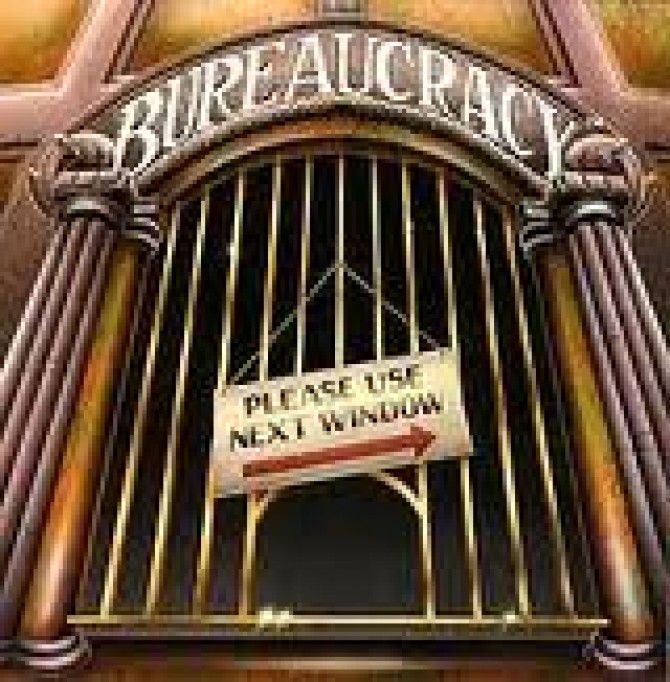Scariest Article of The Year
I read a recent Wall Street Journal article that made me cringe. The title of the article says it all: “The Unsung Beauty of Bureaucracy“.
The headline, as you might imagine, caught my attention; I couldn’t resist reading it. Quite honestly, I fully expected that the title was of the snarky, sarcastic sort–and that the article would be some sort of scathing expose of the absurdity of bureaucracy.
Imagine my surprise (and the sharp uptick in my blood pressure) when I realized that the authors were serious! The article, in a nutshell, said that we need bureaucracy. That too much freedom is a bad thing. That bureaucracy keeps us safe. Sure, it is a bit restrictive and stifling, and it hampers innovation–but it also keeps bad stuff from happening. The article said that, if there had just been more bureaucracy, the BP oii spill of 2005 wouldn’t have happened. It said that, if there had been more centralized, bureaucratic control, the Airbus A380 fiasco would never have happened.
The authors went on to make a statement so patently absurd that I have to quote it in all it’s glory here:
“By the same token, many government functions may be laden with bureaucracy, but the private sector might not do any better with the same tasks. Like the makers of baby products, governments deal with uniquely sensitive problems, from ensuring that terrorists never get past airport security to keeping deadly germs out of the food supply.”
As I write this, I’m having to break and walk away from the computer every few minutes just to keep from yelling at my computer screen.
Here are my issues with this:
- Offshore oil must be one of the most heavily regulated industrial endeavors in the world! I don’t know much about BP and how they run their company, but as far as I’m concerned, It’s ignorant–perhaps even patently dishonest–to imply that BP wouldn’t have happened if there were just more bureaucracy! The government oversight, red tape and general intervention into anything oil related is mind-bogglingly stifling! There were plenty of rules, regulations, inspectors and regulators keeping reign on every facet of BP’s business.
- I know very little of the Airbus fiasco–other than that I can agree with the authors on this: that for all intents and purposes, it looks to have been the worst planned new aircraft in recent history. What I’m far more skeptical about is the cause of the mess. I’m open-minded (my wife might disagree with me there–but hear me out), so I’ll consider any hypothesis. But I’m also a reasonably bright, observant guy. The authors say: more centralization would have kept the A380 on time, in budget and without long-term integrity issues. My natural instinct is to look to the poster child for centralization and bureacracy: the government. They are NOT known for doing things in a timely manner or within budget (in fact, they actively resist even creating a budget)! And most of what they do amounts to an abysmal disservice to those they are supposed to serve. Think about the last time you went to the department of motor vehicles: how fulfilling an experience was that? My point–I’m not sure I’m buying that “the obvious answer is simply more bureaucracy”.
- Finally–and this is the thing that just drives me absolutely bonkers: the writers say, “governments deal with uniquely sensitive problems, from ensuring that terrorists never get past airport security to keeping deadly germs out of the food supply.” What makes these problems “uniquely sensitive”? in fact, what in the world does “uniquely sensitive” mean? Does he mean that “the only people who care about these problems are government officials”? I hope not–because that’s just stupid. Does he mean that “nobody but the government knows how to keep terrorists off planes or germs out of our food”? Again, I hope not–because that’s even more absurd. No food company worth anything “doesn’t care” about keeping the food they make germ free! No airline with any sense of self-preservation doesn’t care about keeping terrorists off their planes! These problems aren’t “uniqely sensitive”; they are just things that businesses need to do in order to remain viable.
I could rant on for pages here (can my colleagues say “amen”?), but let me summarize for you: it’s a logical fallacy to say that some of the worst examples of business failure in the last decade would have been averted if there were just more bureaucracy–at least if you’re going to use the arguments that these authors used.
But the larger point for me is this: bureaucracy is nothing more than a human technology–a tool that someone invented as a hedge against ignorance and dishonesty. And I won’t argue that bureacracy is not somewhat effective at minimizing the risk associated with ignorant or dishonest people. But it’s effective in the sense that an atomic bomb is an effective way to eradicate a bed-bug problem. It’ll work–but the collateral costs are atrocious. Our job as thinking, innovative human beings is to imagine, and devise, a BETTER technology for limiting the impact of ignorance and dishonesty–a technology that doesn’t have side effects that are as painful as the disease it purports to heal.
– Originally published by The Self-Management Institute on March 16, 2013.




